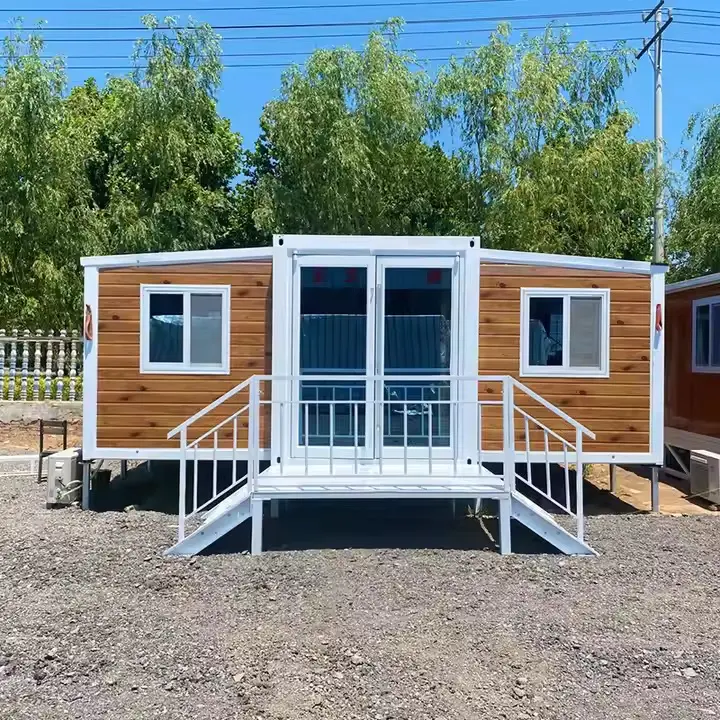What Materials Are Commonly Used in Expandable Container Houses?
A blend of weather-resistant, lightweight, and long-lasting materials are used to build expandable container homes. These materials were chosen to guarantee sustainability, mobility, insulation, and structural integrity. An outline of the typical materials used in their construction may be found below:
1. Steel
Primary Structure:
- Role: Steel is the most commonly used material for the main frame and structural components of expandable container houses.
- Why: It offers strength, durability, and the ability to withstand heavy loads and harsh environmental conditions.
- Common Types:
- Galvanized steel: For corrosion resistance.
- Mild steel: For structural framing and panels.
2. Insulated Panels
Walls, Roofs, and Floors:
- Role: These panels provide thermal insulation, making the container suitable for different climates.
- Materials Used:
- Polyurethane (PU) foam: Lightweight and highly effective for thermal insulation.
- Polystyrene (EPS): Cost-effective and commonly used in budget-friendly designs.
- Rock wool: Fire-resistant and excellent for soundproofing.

3. Aluminum
Doors, Windows, and Trim:
- Why: Aluminum is lightweight, corrosion-resistant, and easy to work with, making it a popular choice for sliding mechanisms, frames, and exterior features.
- Advantages:
- Low maintenance.
- Aesthetic appeal.
- Recyclable.
4. Plywood or Composite Boards
Interior Flooring and Walls:
- Role: Provides a smooth, polished surface for interior spaces while being cost-effective.
- Common Choices:
- Marine-grade plywood: For moisture resistance.
- High-pressure laminate (HPL) boards: For scratch and fire resistance.
5. Glass
Windows and Skylights:
- Role: Used for natural lighting and aesthetics.
- Types:
- Tempered glass: For safety and durability.
- Double-glazed glass: To enhance insulation and reduce energy consumption.
6. PVC or Vinyl
Flooring and Interior Panels:
- Why: PVC is affordable, waterproof, and easy to clean, making it a popular choice for interiors.
- Applications:
- Vinyl flooring: For durability and aesthetic finishes.
- PVC wall panels: For lightweight and moisture-resistant interiors.
7. Rubber or EPDM
Roof Seals and Gaskets:
- Role: Ensures weatherproofing and prevents leaks in expandable sections.
- Advantages: Flexible, long-lasting, and resistant to UV damage.
8. Stainless Steel or Powder-Coated Metal
Exterior Trim and Finishes:
- Why: Adds corrosion resistance and enhances aesthetics.
- Applications: Exterior hinges, locks, and folding mechanisms.
9. Sustainable or Eco-Friendly Materials
Optional Upgrades:
- Examples: Bamboo flooring, recycled wood panels, or solar panels for energy efficiency.
- Why: To meet environmental and sustainability goals.
In conclusion
When these elements are combined, expanding container homes are produced that are comfortable, energy-efficient, sturdy, and movable. The materials guarantee long-lasting performance while adjusting to a variety of environmental circumstances, whether they are utilized for workplaces, homes, or specialized buildings.
Weifang Ante Steel Structure Engineering Co., Ltd. is a professional Expandable Container House manufacturer and supplier in China. 20ft Expandable container house is widely used in all situations, such as office, living room, meeting room, dormitory, shop, toilet, storage, kitchen, shower room, and so on. In addition, the house layout can be customized according to your requirements. Besides, we can change the layout by an add a partition wall and facilities like a toilet, it could be directly used when it arrived at the site Visit our website at www.ante-house.com to learn more about our products. For inquiries, you can reach us at leo@ante-house.com.





